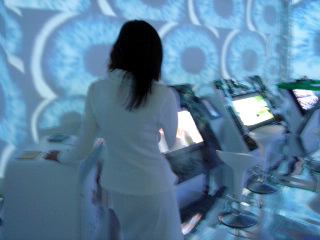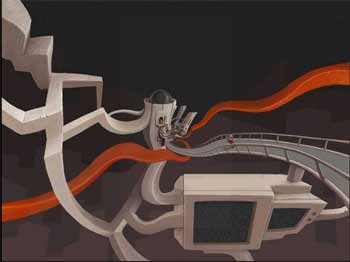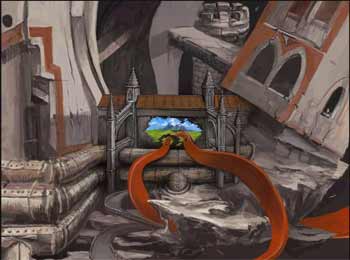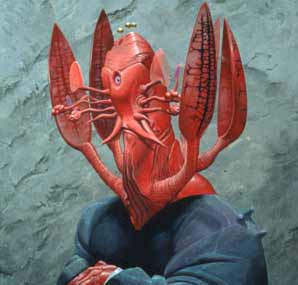The new novel title is definitely Mathematicians in Love. I got the first chapter done last week, modulo a few web-path maze-doors that I’ll inevitably have to carpenter in later on. I hardly saw or talked to anyone last week, other than Sylvia. Somewhat claustrophobic, not having the job at SJSU anymore. I’m still coming to terms with being retired from being a professor.
Having no life, I was blogging a lot, which meant I had all the more reason to stay *ugh* indoors. In one of his interviews, Bill Gibson remarks that he fears blogging drains off some divine essential energy that might otherwise go into writing. Takes the edge off.
But, on the other hand, could be as basically positive as warming up in my journal. Though blogging takes longer, both because you get into wrestling with the ever-refractory computer tech, and because bogging is seductively multimedia. Like I painted the dining-room pink this week, and now, saying that, I have to go and digitally photograph it and upload it, wah-la. Come to think of it, that's another reason I didn't get out much this week. The painting took three days.

By the way, the oil painting on the left is by Isabel, and the one on the right by Georgia.
***
Saturday night we saw a great band, Wilco. I’d never heard them, just bought the ticket on the guess that they’d be good. Saw them in a nice venue, the Frank-Lloyd-Wright style Performing Arts Center in my dear San gets-no-respect Jose. Tix were sold out, but I tried Ticketmaster again in the afternoon and lo and behold, we got two seats in the middle of the ninth row. As usual, Sylvia and I were the oldest people at the concert.
These guys rocked in an interesting way. No hair, no costumes, no spit. The workmanlike musician thing, kind of like the Zappa bands. The drummer looked great and ecstatic, his arms up in happy spider arcs. They’d play this simply catchy ballads and then wipe this great smear of sound across it, like an earthquake. Or pile up huge riffs and loops so that the big hall became an aural funhouse. Everyone was standing up after awhile, and then I was tired and I was sitting down, letting the music wash over me, my eyes closed, turning my head slowly, savoring how the sounds came in differently as I moved my ears. Each person there is hearing something slightly different. The soundscape is like a 3D cellular automaton filling the room, amazing how quickly it updates, amazing how it stays in synch (somewhat) with the twitches and twiddles of the musicians’ picks and knobs.
I’d been kind of brooding over being lonely and isolated this week, also worrying about what goes into Chapter Two of Mathematicians in Love, but sitting there, letting the great sounds of “Spider” wash over me, I was able to open up and let go of my gerbil-wheel concerns. To imagine that God was speaking to me. If I used to be able to believe such a thing when high, why not now believe it sober? The chaos, the big aha, the noise in the sky, the synchronistic universe funneling me the exact impulses that I need to figure out the next chapter of my novel about guys who funnel impulses to alter the universe. The cosmos dancing with me.
Peering deep into the sounds, examining their ragged edges, gnarly as the borders of the Mandelbrot set. Dappled sound. And for the next few days, listening to any sound at all, I realize that I can do the same thing, notice the little patterns. Sounds are like ripples, standing waves in a stream, chaotic enough to be universally computing. The origin of the universe was that one big Om, it's said, though better are the interfering overlapping beat-sounds of the throat-singing monks. But, again, all that creative wealth is everywhere, even in the tapping of my keyboard, the ringing in my ears, the hum of my computer, well maybe not in the hum, I don't think 60 Hz sounds can have much soul, any more than a drum machine or a leaf-blower, it's gotta have that raggedness to it. Why oh why don't drum machines do slightly chaotic beats? It would take like two lines of code, or one extra feedback wire in the processor.
Orpheus was said to play the lyre in such a way that animals would gather around, trees would lean over, and even the rocks would get softer. I’m imagining going a step past that, imagining a science-fiction guitar that's an analog process capable of emulating the universe. Can predict any phenomenon by playing it. “Hum a few bars and I’ll fake the rest of it.”
Somewhat unrelated thought. I remember a, I think it was Bugs Bunny, comic years ago, where he gets a tuba-like Horn of Plenty, and all kind of food comes out of it. Carrots. And then Elmer Fudd jumps up and down on the magic tuba, and it comes apart, and Bugs puts it back together wrong, and when he sqwonks it again, things break and disappear, and he says, oh-oh, it’s a Horn of Nothing.























